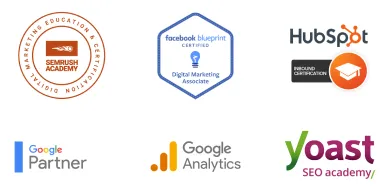TO LEARN IS TO GROW
Learning Center
We do our research and publish our results. Should probably call this the Growing Center.


A Property Manager’s Guide to Digital Marketing
As technology continues to advance, property management companies must embrace the power of digital marketing to soar above the competition and reach their target audience.
Digital marketing encompasses a vast universe of strategies and tactics that can help property management companies promote their services, generate leads, and improve customer engagement.
In this ultimate guide to digital marketing for property management, we will explore the different types of digital marketing and the advantages of each one. From the starry skies of pay-per-click advertising to the galactic force of content marketing, we’ll cover all the key strategies and provide examples of how property management companies can use each one to achieve their marketing goals.
Whether you’re a digital marketing newbie or a seasoned space explorer looking to expand your horizons, this guide will equip you with the knowledge and tools you need to succeed in today’s competitive market. So buckle up and let’s rocket toward digital marketing success!
The Different Types of Digital Marketing
Before we embark on our journey, let’s first clarify what digital marketing means exactly.
Digital marketing is a strategy that uses technologies such as the internet, social media, search engines, mobile devices, and other online channels to connect with customers and promote products or services. It encompasses various tactics, such as social media marketing, email marketing, search engine optimization, content marketing, pay-per-click advertising, and more.
By harnessing the power of digital marketing, property management companies can discover new opportunities for growth and success in the highly competitive market of today.
Social Media Marketing
Social media marketing is like navigating through a vast expanse of space to find and connect with your target audience. It works by creating content that is relevant to your audience and sharing it with them on social media platforms like Facebook, Instagram, Twitter, and more.
Here’s what you can do:
Where to start?: To effectively use social media for marketing, property management companies must first identify their target audience. This includes understanding their interests, behaviors, and preferences.
Choose the right platforms: Once you’ve identified your target audience, you can choose the social media platforms that are most popular among that group. For example, Facebook, Instagram, and LinkedIn are popular platforms for property management companies.
Create engaging content: To grab your audience’s attention, it’s important to create engaging content that speaks to their interests and needs. This can include educational content, behind-the-scenes glimpses, and customer success stories.
Use paid advertising: Social media advertising allows property management companies to reach a wider audience and drive more traffic to their website. By targeting specific demographics and interests, paid social media ads can be an effective way to generate leads and increase conversions.
Here are some examples of social media marketing campaigns that could work in the property management industry:
The use of Instagram to showcase visually appealing properties and highlight the amenities and benefits of living in a particular building or community.
The use of Facebook to promote specials or deals for new tenants, and to share customer testimonials or success stories.
The use of LinkedIn to target commercial property owners or potential business tenants, and to establish thought leadership by sharing insights and expertise on the industry.
Email Marketing
Email marketing is basically a communications satellite that orbits around your audience to send targeted messages and keep them informed about your brand’s journey.
Property management companies can use email marketing to keep in touch with their customers, provide relevant information, and promote their services. Here’s how:
Where to start?: Send targeted emails to a list of subscribers to build relationships, provide information, and promote the business. Examples of these types of emails include welcome series, follow-up emails, automated emails, and personalized emails to prospective tenants.
Nurture leads: Property management companies can use email marketing to nurture leads by sending them personalized and relevant content at each stage of the customer journey. For example, a welcome series of emails can introduce new subscribers to your business, while follow-up emails can provide additional information and incentives to convert them into customers.
Keep in touch: Email marketing can also be used to keep in touch with existing customers. This can include sending out newsletters, reminders, and exclusive offers to keep your brand top-of-mind and encourage repeat business.
Here are some examples of email marketing campaigns that could work in the property management industry:
Automated emails to renters who have recently moved in, offering tips on how to settle in and reminders of important dates, like rent due dates or lease renewals.
Newsletters with updates on the latest property management news and trends, like new regulations or technology innovations.
Personalized emails to prospective tenants with information about available properties that match their preferences.
Search Engine Optimization (SEO)
Search Engine Optimization (SEO) uses tailored strategies to increase the visibility of a website or a specific page within search engine results pages (SERPs) for targeted keywords or phrases. In the vastness of the digital universe, 97% of home buyers rely on search engines (like Google and Bing) to navigate the stars and find what they need. That’s why ranking highly in search results can attract more customers and bring you closer to your marketing goals!
Here’s how it works:
Where to start?: SEO is the practice of optimizing your website and its content to rank higher in search engine results pages (SERPs). This involves improving the quality and relevance of your website’s content and structure, so search engines can easily crawl and index it.
Property management companies can optimize their website for SEO by doing the following:
Conduct keyword research to identify the most relevant and high-traffic keywords to target.
Create high-quality and informative content, including blog posts and articles, that use those keywords strategically.
Improve website structure and design, including navigation, site speed, and mobile-friendliness.
Build high-quality backlinks to increase authority and credibility.
Here are some examples of SEO strategies that could work in the property management industry:
Creating keyword-rich content that addresses common questions and concerns of potential renters or property owners.
Optimizing property listings with descriptive and detailed information, including high-quality photos and videos, to increase engagement and visibility.
Building backlinks from reputable websites, such as local directories, real estate blogs, or industry associations, to improve authority and drive more traffic to your site.
Pay-Per-Click Advertising (PPC)
Pay-Per-Click Advertising (PPC) involves bidding on relevant keywords or phrases to your target audience and creating ads that appear at the top of search engine results pages (SERPs).
When a user searches for a keyword or phrase, and your ad is deemed relevant by the search engine or social media platform, it will appear at the top of the page, labeled as an ad.
This means that PPC advertising can be a quick and effective way to get your brand or product in front of potential customers and drive targeted traffic to your website. Here’s how:
Where to start?: PPC advertising involves paying for ads that appear at the top of search engine results pages (SERPs) or on social media platforms. You only pay when someone clicks on your ad, which means you can target your budget to reach the most qualified leads.
Reach your target audience: Property management companies can use PPC advertising to reach their target audience by targeting specific demographics, locations, and interests.
Drive traffic to your website: PPC advertising can be an effective way to drive traffic to your website and generate leads. By directing users to a specific landing page or offer, you can increase the likelihood of conversions.
Here are some examples of PPC campaigns that could work in the property management industry:
Targeting keywords related to specific property types, such as “office space” or “commercial property for lease.”
Creating ad copy that highlights unique features or amenities of a property, like a pool or a gym.
Using retargeting ads to target users who have previously visited your website or shown interest in your services.
Content Marketing
Content marketing involves creating and sharing valuable content to attract and engage a specific target audience.
Think of it like creating a constellation of informative and engaging content to guide your audience through the vast digital frontier.
Property management companies can use content marketing to educate and engage their target audience, and to position themselves as experts in their industry. Here’s how:
Where to start?: Content marketing can take many different forms, such as blog posts, videos, social media posts, infographics, and more. The format of the content will depend on the target audience, the goals of the campaign, and the company’s resources.
Educate and engage your audience: Property management companies can use content marketing to educate and engage their target audience by providing them with useful and relevant information about the industry, such as tips on how to find the perfect rental property or how to attract new tenants.
Here are some examples of content marketing that could work in the property management industry:
Creating blog posts that address common questions or concerns of potential renters or property owners, like “10 tips for a successful rental application” or “how to maintain your property to attract long-term tenants”.
Producing videos that showcase the features and amenities of a property or community, like a virtual tour or a video testimonial from a satisfied tenant.
Sharing educational content on social media platforms, like infographics or how-to guides, to attract new followers and build engagement.
Developing a Comprehensive Digital Marketing Strategy
In today’s digital age, there are countless resources and tools available to help you develop a strong digital marketing strategy.
By incorporating these resources into your overall plan, you can maximize their potential and chart a course for success
Here are some tips for creating a digital marketing strategy for your business:
Determine the audience you want to reach. Gain a deep understanding of your target audience, including their needs, behaviors, and preferences. This will enable you to identify which types of digital marketing will be most effective in reaching that audience, allowing you to create a plan for implementing those strategies.
Choose the right digital marketing channels. Different channels work best for different audiences and goals. For instance, social media marketing can be great for brand awareness, while email marketing can be more effective for lead generation.
Set clear goals for each type of digital marketing you want to implement. By defining specific goals, you can create a more focused plan to achieve your overall marketing objectives. Some examples of goals could be increasing followers on social media or achieving a certain number of clicks on a paid ad.
Create valuable content. To attract and engage your target audience, you need to create authentic, informative content that addresses their needs and interests.
Set time frames for each strategy. Make sure to set deadlines for each digital marketing tactic to stay on track and avoid any chaos during the process. By doing so, you’ll stay organized and ensure that everything gets done on time.
Monitor and analyze your results. Use analytics and data to track the performance of your marketing campaigns and adjust your strategy accordingly.
Tools and Platforms for Tracking Digital Marketing Performance
Here are some tools and platforms that can help you track your digital marketing performance and make data-driven decisions.
Google Analytics
This is the go-to tool for digital analytics. It helps you track everything from where your website traffic is coming from to engagement metrics and geographic location. And the best part? It’s free!
Facebook Insights
Like Google Analytics, Facebook Insights can tell you how many people are visiting your page, how long they’re staying, and which posts are getting the most engagement. Use this tool to optimize your ads and figure out which ones are working best.
SEMrush
This tool helps you analyze your website’s SEO and compare your performance to that of your competitors. It’s a great way to identify opportunities to improve your online visibility and attract more visitors to your website.
Hootsuite
This social media management platform allows you to schedule and publish posts on multiple social media channels, track engagement and performance, and monitor mentions of your brand online. It’s a great way to stay on top of your social media game and engage with your audience effectively.
Hubspot
Hubspot is a great tool for tracking your marketing campaigns. You can see which channels are bringing in the most leads and which content is resonating the most with your audience. Keep in mind, though, that this one comes with a price tag.
Conclusion
In the fast-paced digital landscape of today, property management companies need to adapt their marketing strategies to stand out from the competition and attract new customers. With a comprehensive digital marketing strategy, companies can leverage the power of technology to connect with target audiences, increase brand awareness, generate more leads, and ultimately drive revenue growth.
At LOJO Marketing, we’re committed to helping property managers and investors succeed in the digital age. We know that the housing industry is evolving, and you need a partner who can guide you through these changes. Get in touch with us today at (916) 303-4080 and let us help you take your property management business to the next level!
Built for Growth. Backed by 25 Years of Trust.
For over two decades, LOJO has been a trusted partner to hundreds of businesses just like yours. Whether working directly with owners, managers, teams, or boards of directors, our goal remains the same: to be a reliable and results-driven asset to your business.
Over the years, we’ve carefully built a team of experts—each selected for their unique skills, strengths, and personalities. Our clients choose LOJO because they know we genuinely care about their success.
And after 25 years of helping businesses grow, we’re more committed than ever.


Built for Growth. Backed by 25 Years of Trust.
For over two decades, LOJO has been a trusted partner to hundreds of businesses just like yours. Whether working directly with owners, managers, teams, or boards of directors, our goal remains the same: to be a reliable and results-driven asset to your business.
Over the years, we’ve carefully built a team of experts—each selected for their unique skills, strengths, and personalities. Our clients choose LOJO because they know we genuinely care about their success.
And after 25 years of helping businesses grow, we’re more committed than ever.




Matthew Rogers, President
iProspect Check
After spending several months reviewing multiple proposals from several different companies we engaged LOJO to develop a new website that represents our company effectively. We worked initially with Stephen Platte who helped create the scope of the project. Stephen was knowledgeable and always followed up with me on time and as promised.
He "closed the deal" for LOJO with his professionalism, service orientation and easy going approach. Once we signed the contract we were introduced to Jay Kelly who would be the creative lead for LOJO. This was the most challenging part of the project for my company, as there was no shortage of ideas from our side. Jay managed the project flawlessly, and once we had all agreed to the design, Jay introduced us to Eric.
Eric Lay is one of the founders of LOJO. Eric took the design we had developed and brought it to life. We delivered content as quickly as he requested it. Eric kept the project on task and we responded by exceeding every deadline for content. In turn, once provided, literally not a day went by that Eric didn't add the content and take the next step. In just a few weeks we launched our new website. Eric is a pleasure to work with.
His positive attitude and consultative approach really enhanced the experience and made a big difference for us in the outcome of our project. We would welcome you to visit our website to take a look at the quality work of LOJO. We are very pleased with LOJO and look forward to working with them in the future as we pursue an aggressive SEO strategy."
After spending several months reviewing multiple proposals from several different companies we engaged LOJO to develop a new website that represents our company effectively. We worked initially with Stephen Platte who helped create the scope of the project. Stephen was knowledgeable and always followed up with me on time and as promised.
He "closed the deal" for LOJO with his professionalism, service orientation and easy going approach. Once we signed the contract we were introduced to Jay Kelly who would be the creative lead for LOJO. This was the most challenging part of the project for my company, as there was no shortage of ideas from our side. Jay managed the project flawlessly, and once we had all agreed to the design, Jay introduced us to Eric.
Eric Lay is one of the founders of LOJO. Eric took the design we had developed and brought it to life. We delivered content as quickly as he requested it. Eric kept the project on task and we responded by exceeding every deadline for content. In turn, once provided, literally not a day went by that Eric didn't add the content and take the next step. In just a few weeks we launched our new website. Eric is a pleasure to work with.
His positive attitude and consultative approach really enhanced the experience and made a big difference for us in the outcome of our project. We would welcome you to visit our website to take a look at the quality work of LOJO. We are very pleased with LOJO and look forward to working with them in the future as we pursue an aggressive SEO strategy."

Matthew Rogers, President
iProspect Check
The team at LOJO were wonderful to work with. They are well organized and very patient as we worked through our marketing strategy and developed a well thought out and clear action plan at a reasonable price. We will definitely be back for our future campaign needs."

Jon Crosby, Founder
Dazil

